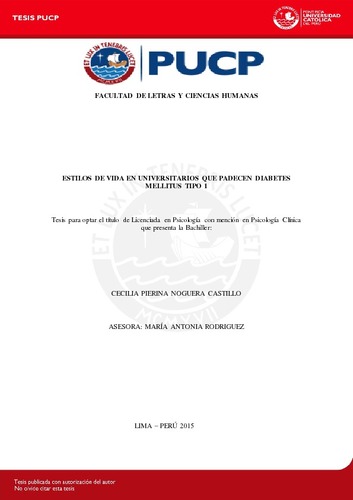| dc.contributor.advisor | Rodríguez García, María Antonia | es_ES |
| dc.contributor.author | Noguera Castillo, Cecilia Pierina | es_ES |
| dc.date.accessioned | 2016-07-06T18:52:19Z | es_ES |
| dc.date.available | 2016-07-06T18:52:19Z | es_ES |
| dc.date.created | 2015 | es_ES |
| dc.date.issued | 2016-07-06 | es_ES |
| dc.identifier.uri | http://hdl.handle.net/20.500.12404/7085 | |
| dc.description.abstract | La Organización Mundial de la Salud indica que en el 2014, 346 millones de personas padecían de diabetes, siendo los niños y adolescentes una población más propensa a desarrollar la diabetes mellitus tipo 1. En base a ello, la presente investigación buscó describir los estilos de vida e impacto de la diabetes durante la etapa universitaria de jóvenes insulino dependientes. La muestra del estudio se integró por 7 jóvenes entre 18 y 24 años. Se utilizó el análisis de contenido para el análisis de datos en base a las entrevistas semi-estructuradas realizadas con el programa ATLAS.ti. Se identificó que los jóvenes tienen un claro conocimiento de los adecuados cuidados que requiere su condición, sin embargo, describen que factores del contexto no permiten llevar un estilo de vida saludable. Como consecuencia, hacen uso de diferentes cantidades de insulina para compensar sus conductas inadecuadas entre las que se encuentran consumo de alimentos prohibidos y poca actividad física, además muestran mayor autonomía para llevar su tratamiento haciendo uso de lo aprendido durante la etapa escolar y las experiencias propias de su diagnóstico. | es_ES |
| dc.description.abstract | According to the World Health Organization, in 2014, 346 million people were diagnosed with diabetes. Children and adolescents are more likely to have diabetes type 1. This research describes the lifestyle and impact of the illness on undergraduate students with diabetes. The ages of the participants fluctuate between 18 and 24 years. Content analysis of semi-structured interviews using ATLAS.ti was used to identify categories that describe the common elements between the participants. The analysis indicates that young people are informed of the proper care required by their condition; however, aspects of their daily routine serve as obstacles in maintaining a healthy lifestyle. Consequently, they use different amounts of insulin to compensate their inappropriate behavior (e.g. the consumption of forbidden food and low physical activity). They also identified that they are more autonomous in managing their illness at this stage of their lives, so they need to adapt again to what they learned about their treatment during the school years. | es_ES |
| dc.language.iso | spa | es_ES |
| dc.publisher | Pontificia Universidad Católica del Perú | es_ES |
| dc.rights | Atribución-NoComercial-SinDerivadas 2.5 Perú | * |
| dc.rights | info:eu-repo/semantics/openAccess | es_ES |
| dc.rights.uri | http://creativecommons.org/licenses/by-nc-nd/2.5/pe/ | * |
| dc.subject | Diabetes | es_ES |
| dc.subject | Estudiantes universitarios--Investigaciones. | es_ES |
| dc.subject | Estilos de vida. | es_ES |
| dc.title | Estilos de vida en universitarios que padecen diabetes mellitus tipo 1 | es_ES |
| dc.type | info:eu-repo/semantics/bachelorThesis | es_ES |
| thesis.degree.name | Licenciado en Psicología Clínica | es_ES |
| thesis.degree.level | Título Profesional | es_ES |
| thesis.degree.grantor | Pontificia Universidad Católica del Perú. Facultad de Letras y Ciencias Humanas. | es_ES |
| thesis.degree.discipline | Psicología Clínica | es_ES |
| renati.discipline | 313026 | es_ES |
| renati.level | https://purl.org/pe-repo/renati/level#tituloProfesional | es_ES |
| renati.type | http://purl.org/pe-repo/renati/type#tesis | es_ES |
| dc.publisher.country | PE | es_ES |
| dc.subject.ocde | https://purl.org/pe-repo/ocde/ford#5.01.00 | es_ES |






